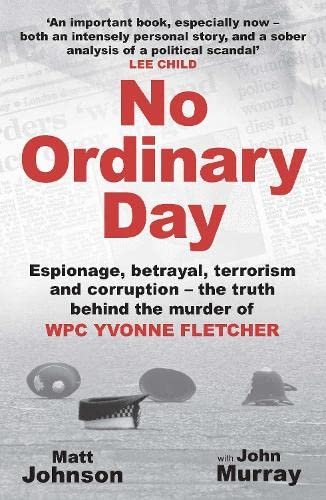No Ordinary Day
-
-
Non-Fiction; True Crime
-
June 2023
-
World Rights: Adlib Publishers
On 17 April 1984, as police and anti-Gaddafi demonstrators gathered in the street outside the Libyan People’s Bureau in London, they had no way of knowing they were about to become part of one of the greatest tragedies in British policing history. At 10.17a.m. automatic gunfire rained down on them. WPC Yvonne Fletcher was hit in the back and later died from her injuries. Twelve demonstrators were wounded. The gunmen were Libyans, both concealed behind a first-floor window of the Bureau.
Two weeks later, all those present inside the Bureau, including everyone suspected of involvement in the attack, were deported from the UK. Men guilty of terrorism and murder were neither arrested nor prosecuted.
As Yvonne Fletcher lay dying, her colleague and close friend PC John Murray cradled her in his arms. Before she lost consciousness, he promised her he would not rest until those responsible for her murder had been brought to justice.
Thirty-seven years would pass before John was able to fulfil that promise. Whilst writing John Murray’s story, Matt Johnson identified UK government duplicity, secret service deals and how a plan to finally defeat the all-powerful National Union of Mineworkers would place the government in an invidious position when pro- and anti-Gaddafi elements brought their fight to the streets of the UK. He was able to discover why, in 1984, her killers had been allowed to go free. His extensive research also revealed how events on 17 April resulted in a 30-year government campaign to bring the police services of the UK under political control, a campaign that has driven our police service into the state of disarray we see today.
The story behind what happened outside the Libyan People’s Bureau is complex, shocking and revealing. Matt Johnson’s compelling account pulls together a series of seemingly unconnected threads into a coherent whole, incorporating all the inter-related elements of politics, business, secret service missions and chance.
For some, this will be a very uncomfortable read. For many, it may confirm what they already suspect, that we, the public, know very little of the decisions being made by our elected representatives and the actions taken by official bodies, supposedly in our best interests.
Selected Praise
“An important book - especially now, both an intensely personal story, and a sober analysis of a political scandal.”
“Espionage, betrayal, terrorism, corruption and murder. All the ingredients of a Le Carré novel, only it’s real.”
“A powerful and timely account of one of the darkest chapters in British policing history.”

